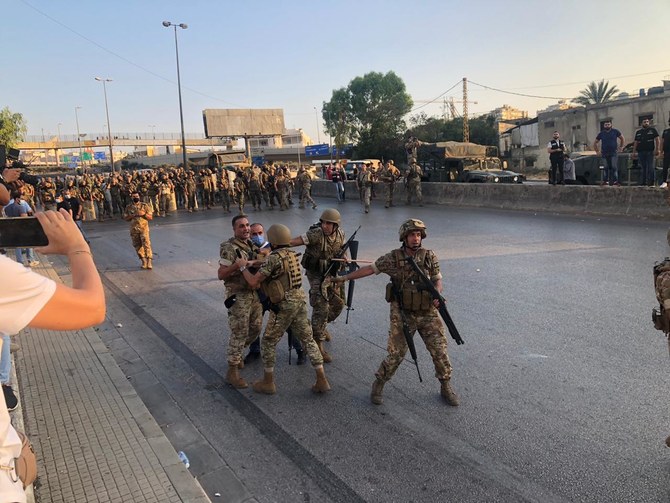BEIRUT: Riot police fought running battles with opposing groups of protesters near Beirut’s Presidential Palace on Saturday after rights activists clashed with rival demonstrators chanting their support for President Michel Aoun.
Clashes erupted after activists marking the 40th day since the deadly Beirut port explosion on Aug. 4 were confronted by Free Patriotic Movement supporters who tried to break through a security blockade.
Troops brought in to quell the violence formed a human barricade to keep the rival groups apart, but were pelted with stones and forced to fire into the air to keep protesters at bay.
Chanting “Revolution” and “Aoun Out,” black-clad demonstrators set up mock gallows and called for Lebanon’s leadership to face justice over the blast.
Activist Mahmoud Fakih told Arab News: “We called on all protesters to wear black as an expression of our indignation at the neglect that led to the unnecessary death among civilians.”
Large numbers of Beirut residents left homeless by the explosion also joined the protest, waving Lebanese flags.
The Lebanese army said in a tweet: “The army is working to form a human barrier to separate the two demonstrations in the vicinity of the Republican Palace. It was forced to fire in the air after demonstrators pelted its members with stones and hit them with sticks.”
Rival Free Patriotic Movement supporters responded to activists’ chants with cries of “God, Lebanon and Aoun only” — a slogan dating back to the 1980s.
Aoun faced widespread criticism on social media in the past week after distributing tea donated by Sri Lanka to the Lebanese people after the explosion to members of the Republican Guard Brigade and their families.
On the 40th-day memorial of the port explosion, which killed 192 people, Jan Kubis, UN special coordinator for Lebanon, tweeted: “With hearts full of pain, we remember the victims of the destructive explosion in Beirut. Only transparent and credible investigations, comprehensive accountability and full justice can prevent the recurrence of such a tragedy, such a crime.”
Lebanese officials faced another challenge at the weekend as the deadline set down by French President Emmanuel Macron to form a new government expired.
During his visit to Beirut two weeks ago, Macron said that government reforms demanded by the international community to help Lebanon address its economic crisis were a precondition of any aid to the country.
Mustapha Adib, the prime minister designate, was due to go to the Presidential Palace to hand over a copy of the names of his government to the Aoun. However, palace sources said there was no appointment for Adib to meet Aoun.
Meanwhile, Sheikh Naim Qassem, Hezbollah’s deputy, told the Russian RT channel on Saturday that he refused to accept “a government of independents.”
“The technocrat government has already been tried. It needs political support to strengthen it,” he said.
Qassem said that recent US sanctions against former Lebanese ministers Ali Hassan Khalil and Youssef Fenianos “aim to change the political equation in Lebanon and keep the country under pressure.”
Observers say that if Adib insists on forming a government that fails to acknowledge the demands of political parties in power, his leadership is unlikely to win the backing of Parliament. That will result in a collapse of the French initiative and Lebanon facing its crises alone.
Aoun sent Lebanon’s security chief Maj. Gen. Abbas Ibrahim to ask the French presidential working group to amend the conditions for forming the government.
According to Lebanese media reports, Ibrahim took three requests to Paris: To extend the deadline, not to apply the principle of rotation to the finance ministry, and to allow the president to name some ministers.
However, the reports said that France refused to delay the formation of a new government, warning that “in the current crisis, no one has privileges.”

























